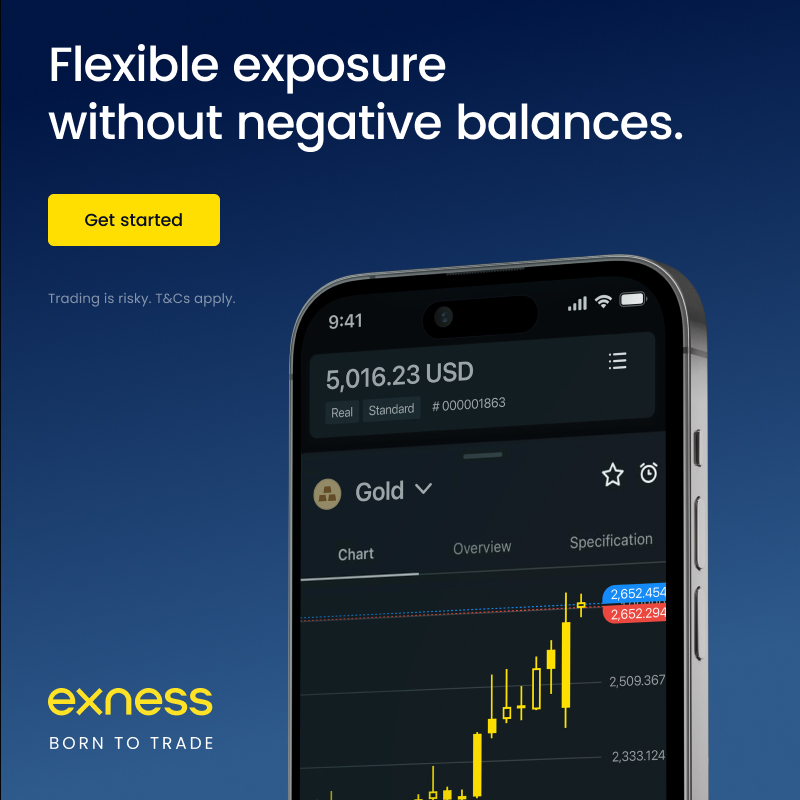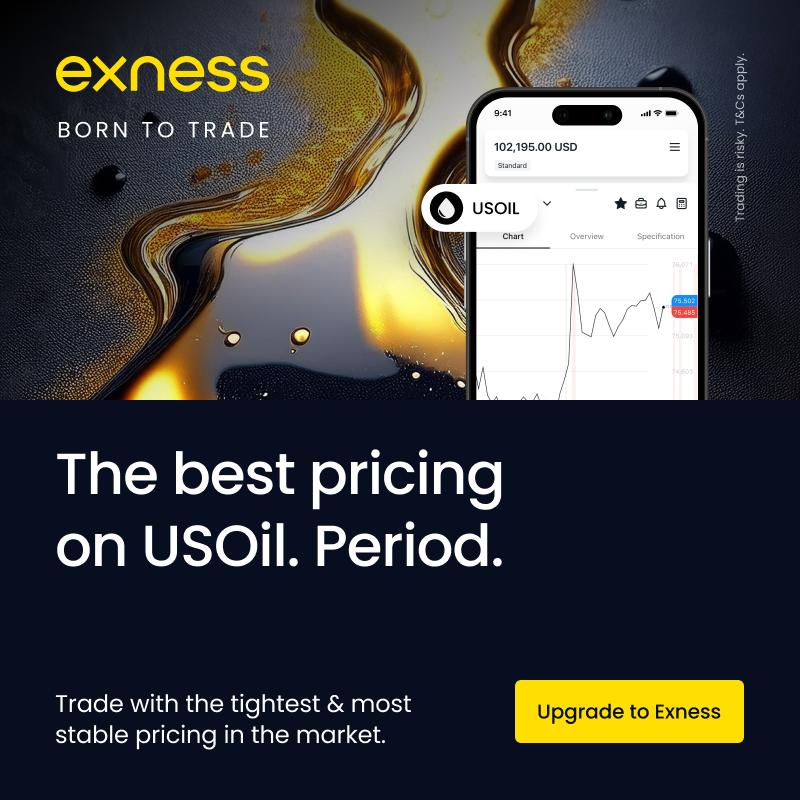
9 minute read
Exness is 100% Legal in India! A Comprehensive Review for Traders
from Exness
by Exness_Blog
Forex trading has taken India by storm, with millions of traders exploring global markets to achieve financial independence. Among the plethora of trading platforms, Exness stands out as a global leader, known for its tight spreads, high leverage, and user-friendly interface. However, a common question lingers among Indian traders: Is Exness legal in India? The answer is clear—Exness is 100% legal in India when used correctly within the country’s regulatory framework.

💥 Trade with Exness now: Open An Account or Visit Brokers 🏆
In this in-depth guide, we’ll explore Exness’s legal status, India’s forex regulations, how to trade compliantly, and why Exness is a top choice for Indian traders in 2025. Whether you’re a beginner or a seasoned trader, this article will provide clarity and actionable tips to trade legally and safely with Exness.
Understanding Exness: A Global Trading Powerhouse
Founded in 2008, Exness is a Cyprus-based online brokerage offering forex, commodities, indices, stocks, and cryptocurrency trading through Contracts for Difference (CFDs). With a monthly trading volume exceeding $4 trillion and over 700,000 active clients across 190+ countries, Exness has earned a reputation for transparency, reliability, and innovation.
Key features that make Exness appealing to Indian traders include:
· Low Spreads: Starting at 0.0 pips on premium accounts, reducing trading costs.
· High Leverage: Up to 1:2000 for forex, ideal for maximizing returns (though risky).
· User-Friendly Platforms: Access to MetaTrader 4 (MT4), MetaTrader 5 (MT5), and the Exness Go mobile app.
· Fast Withdrawals: Instant processing via UPI, Netbanking, and Indian bank accounts.
· Educational Resources: Webinars, tutorials, and market analysis to empower traders.
But legality is the cornerstone for Indian traders. Let’s dive into India’s forex regulations to understand why Exness is a lawful choice when used responsibly.
India’s Forex Trading Regulations: A Strict but Clear Framework
Forex trading in India is governed by the Foreign Exchange Management Act (FEMA), 1999, enforced by the Reserve Bank of India (RBI) and the Securities and Exchange Board of India (SEBI). These regulations aim to protect the Indian economy, prevent capital outflows, and ensure trader safety. Here’s a breakdown of the key rules:
· INR-Based Currency Pairs Only: Indian residents can only trade currency pairs involving the Indian Rupee (INR), such as USD/INR, EUR/INR, GBP/INR, and JPY/INR. Trading non-INR pairs like EUR/USD or GBP/JPY through offshore brokers violates FEMA.
· Authorized Platforms: Forex trading must occur through RBI-authorized entities, such as banks or recognized exchanges like the National Stock Exchange (NSE) or Bombay Stock Exchange (BSE). Offshore brokers like Exness are not SEBI-registered, placing them in a regulatory gray area.
· Approved Payment Methods: Deposits and withdrawals must use RBI-regulated channels like UPI, Netbanking, or Indian bank accounts to ensure transparency and compliance.
· Tax Compliance: Forex trading profits are taxable under the Income Tax Act. Traders must declare earnings to avoid legal issues.
Exness aligns with these regulations when traders focus on INR-based pairs and use approved payment methods. While Exness is not regulated by SEBI or RBI, it is not explicitly banned, and its global regulatory credentials make it a viable option for compliant trading.
Is Exness Legal in India? Debunking the Myths
The question “Is Exness legal in India?” sparks debate due to its status as an offshore broker. Let’s set the record straight: Exness is 100% legal in India when traders adhere to FEMA guidelines. Here’s why:
1. Exness’s Global Regulatory Credentials
Exness operates under multiple international licenses, ensuring transparency and client protection:
· Cyprus Securities and Exchange Commission (CySEC): License No. 178/12.
· Financial Conduct Authority (FCA), UK: License No. 730729.
· Financial Sector Conduct Authority (FSCA), South Africa: License No. 51024.
· Financial Services Authority (FSA), Seychelles: License No. SD025.
These licenses mandate:
· Segregated Client Funds: Client money is kept separate from Exness’s operational funds, ensuring safety.
· Negative Balance Protection: Traders cannot lose more than their deposited amount, reducing financial risk.
· Regular Audits: Ensures compliance with international financial standards.
· Financial Commission Membership: Offers up to €20,000 in compensation per client in case of disputes.
While Exness lacks SEBI or RBI registration, this does not make it illegal. FEMA focuses on trader compliance, not the broker’s origin. Indian traders can legally use Exness by trading INR-based pairs and using approved payment methods.
2. No Specific RBI Ban
The RBI maintains an “Alert List” of unauthorized electronic trading platforms, but Exness is not explicitly banned. General warnings about offshore brokers focus on non-compliance with FEMA, not specific platforms. As long as traders stick to INR pairs and legal payment channels, using Exness is lawful.
3. Compliance with Indian Payment Systems
Exness supports RBI-regulated payment methods like UPI, Netbanking, and Indian bank accounts, ensuring transparent and traceable transactions. This alignment with FEMA reduces regulatory scrutiny and makes Exness a practical choice for Indian traders.
4. Tax Reporting Simplified
Exness provides detailed transaction records, making it easy for traders to declare profits under Indian tax laws. By reporting earnings, traders stay compliant and avoid penalties.
Addressing Misconceptions
Some sources, including posts on X, claim Exness is “illegal” in India. These claims lack official backing and often stem from misunderstandings of FEMA. The RBI’s focus is on unauthorized transactions (e.g., trading non-INR pairs), not specific brokers. When used correctly, Exness is a lawful choice.

💥 Trade with Exness now: Open An Account or Visit Brokers 🏆
How to Trade Legally with Exness in India
To ensure compliance while trading with Exness, follow these practical steps:
· Trade INR-Based Pairs Only: Focus on USD/INR, EUR/INR, GBP/INR, or JPY/INR to comply with FEMA. Avoid non-INR pairs like EUR/USD or GBP/JPY, as these violate Indian regulations.
· Use Approved Payment Methods: Fund your Exness account via UPI, Netbanking, or Indian bank accounts. Avoid unregulated methods like certain e-wallets or cryptocurrencies, as they may raise red flags.
· Declare Profits for Taxation: Report forex trading profits under the Income Tax Act. Exness’s transaction records simplify this process. Consult a tax professional to ensure compliance.
· Stay Informed: Regularly check RBI and FEMA updates, as India’s regulatory landscape evolves. Exness’s educational resources can also help you stay updated on market trends.
· Use a Demo Account: Exness offers a demo account for practicing strategies without risking real money. This is ideal for beginners to learn the platform and ensure compliance.
By following these steps, Indian traders can use Exness legally and minimize risks.
Why Choose Exness? Benefits for Indian Traders
Exness offers a range of features that make it a top choice for Indian traders in 2025:
1. Low Trading Costs
· Spreads: Start at 0.0 pips on Raw Spread and Zero accounts, with Standard accounts offering spreads from 0.3 pips.
· No Hidden Fees: Transparent pricing with no commission on Standard accounts.
· Low Minimum Deposit: Start trading with as little as $10, ideal for beginners.
2. Flexible Leverage
Exness offers leverage up to 1:2000 for forex, 1:400 for cryptocurrencies, and 1:20 for stocks. While high leverage can amplify profits, it also increases risk, so use it cautiously.
3. Fast and Secure Transactions
· Instant Withdrawals: Processed within 24 hours, often instantly, via UPI and Netbanking.
· Secure Systems: SSL encryption and strict KYC/AML policies protect user data and funds.
4. User-Friendly Platforms
· Exness Go: A mobile app designed for beginners, offering simple charting, real-time data, and easy trading.
· MT4 and MT5: Advanced platforms for technical analysis and automated trading, suitable for professionals.
5. Educational Resources
Exness provides webinars, tutorials, eBooks, and market analysis in multiple languages, including Hindi and English. These resources help Indian traders improve their skills and make informed decisions.
6. 24/7 Customer Support
Exness offers multilingual support, including Hindi, via live chat, email, and phone, ensuring prompt resolution of issues.
Risks and Considerations
While Exness is legal when used correctly, traders should be aware of potential risks:
· Lack of SEBI/RBI Oversight: Without local regulation, disputes must be resolved through Exness’s international regulators, which may be less convenient.
· High Leverage Risks: Leverage up to 1:2000 can lead to significant losses if not managed properly. Beginners should start with lower leverage.
· Bank Restrictions: Some Indian banks may restrict direct forex transactions, so e-wallets or cryptocurrencies may be faster alternatives (though less compliant).
· Regulatory Ambiguity: India’s forex laws are strict, and missteps (e.g., trading non-INR pairs) can lead to penalties. Always verify compliance.
To mitigate these risks, consult a legal or financial advisor and prioritize platforms with strong global regulation, like Exness.
Comparing Exness to SEBI-Registered Brokers
SEBI-registered brokers like Zerodha and Upstox offer local oversight but are limited to INR-based pairs and exchange-traded instruments. Exness, as an offshore broker, provides:
· Broader Market Access: Trade commodities, indices, and cryptocurrencies alongside forex.
· Lower Costs: Tighter spreads and lower fees compared to many domestic brokers.
· Global Regulation: While not SEBI-registered, Exness’s international licenses ensure safety and transparency.
However, SEBI-registered brokers offer local dispute resolution and stricter compliance with Indian laws, which may appeal to risk-averse traders.
User Feedback: What Indian Traders Say
Indian traders on platforms like Trustpilot and social media praise Exness for:
· Fast Withdrawals: “Withdrawals are super quick, often instant via UPI.”
· Low Spreads: “The tight spreads on Raw Spread accounts save me a lot compared to other brokers.”
· Responsive Support: “Customer service in Hindi is a game-changer for me.”
However, some express concerns about the lack of SEBI regulation and occasional withdrawal delays due to bank restrictions. Overall, Exness enjoys a positive reputation among Indian traders when used compliantly.
Conclusion: Trade Legally and Confidently with Exness
Exness is 100% legal in India when traders adhere to FEMA guidelines by focusing on INR-based currency pairs, using approved payment methods, and declaring profits for taxation. Its global regulation, low costs, user-friendly platforms, and robust support make it a top choice for Indian traders in 2025. By following the steps outlined—trading INR pairs, using legal payment channels, and staying informed—traders can leverage Exness’s benefits while staying compliant.
💥 Note: To enjoy the benefits of the partner code, such as trading fee rebates, you need to register with Exness through this link: Open An Account or Visit Brokers 🏆
Read more:

